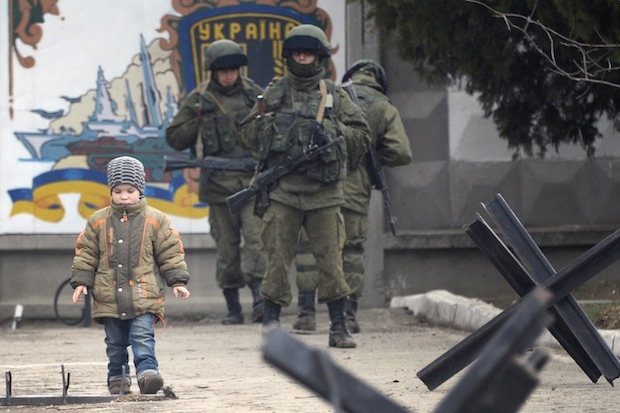Tallinn, Monday
‘I have some sad news,’ says the Estonian politician, as we sit down to dinner. ‘War has broken out.’ The pain in his voice is palpable. For this patriotic man, and many like him, Russia’s invasion of Crimea has reawakened memories of an era everyone here hoped was over. Wandering the cobbled streets of Tallinn, Russia seems a long way away. You could be in Bremen or Lubeck. Yet Tallinn’s European heritage is only half the story. It’s been Estonia’s capital for just 45 years, from 1918 (when Estonia first won its independence) to 1940 (when Stalin invaded) and again from 1991 (when Estonia regained its independence) to today. About a quarter of Tallinn’s population are Russian speakers, as are about a quarter of all Estonians — roughly the same proportion that exists in Ukraine. Recent events have also rekindled memories of 2007, when the Estonian prime minister decided to move a controversial Soviet war memorial from the centre of Tallinn to a military cemetery on the outskirts. Local Russian speakers rioted. Estonian news, government and banking websites were disabled. Estonia accused Russia of orchestrating a covert cyberwar. Russia denied it. Estonia’s two language communities still keep their distance. Tens of thousands of Russian speakers only hold grey ‘Alien’s Passports’ rather than the full passports granted to non-Estonians who’ve passed the state’s Estonian language test. Russians have always lived in Tallinn, alongside the Germanic merchants who made this one of medieval Europe’s most prosperous ports. After it was conquered by Peter the Great, it became Russia’s gateway to the West. But many of the Russian speakers who live here today were shipped in from the USSR after 1945, in an attempt to undermine Estonia’s identity. Meanwhile, tens of thousands of Estonians were transported to Siberia. Others — both Estonians and Russians — just disappeared. One of them was the grandfather of Jana, a translator I met in Tallinn. In 1940, when Stalin invaded, Jana’s grandfather, a Russian, was drafted into the Red Army. In 1941, when Hitler invaded, he was drafted into the Wehrmacht. In 1944, when Stalin returned, he was drafted into the Red Army again, but this time he said he’d had enough. He was taken to the KGB HQ, a grand Jugenstil building in Tallinn. Jana’s grandmother came to visit her husband here. She brought him bread and trousers, but when she returned for a second visit, he was no longer there. She never saw him or had word of him again. When I visited the building with Jana there was a sign outside: ‘Luxury flats for sale.’ As in Ukraine, Estonia’s Russian speaking population isn’t evenly dispersed. In Narva, on the Russian border, over 90 per cent are Russian speakers. On the wooded islands off Estonia’s west coast, conversely, there are hardly any native Russian speakers. On Saaremaa, Estonia’s biggest island, I spend a day with Erika, who grew up here under the Soviet regime. ‘Estonians have always wanted their own home, their own piece of land,’ she says. ‘We’re individualistic.’ So how did Estonians resist Soviet attempts to erase their individuality? How did they survive half a century of collectivisation? ‘We could still see Finnish TV,’ explains Erika. ‘They couldn’t stop it.’ But there was more to it than that. These tough, resourceful people are well used to fighting for their homeland. Here on Saaremaa, Sweden is closer by boat than Tallinn. We stop at a Soviet war memorial, a huge concrete obelisk looming above the Baltic, built to mark the Red Army’s victory over the Wehrmacht. A few years ago, a short walk away, workmen uncovered two Viking longboats. In them were the skeletons of 40 warriors, killed in a forgotten battle here. Back in Tallinn, I spend a night at the Telegraaf hotel. Before it became a hotel, this building was Tallinn’s telephone exchange. In 1924, local communists, supported by the Soviet Union, stormed the exchange in an attempt to overthrow the Estonian government. As they were sending a telegram to the USSR, requesting military back-up, an Estonian general called Ernst Podder broke into the building with several soldiers and shot all six of them. Thanks to his quick thinking, that telegram was never sent. For Britons, the Crimean crisis may seem like a quarrel in a faraway country between people of whom we know nothing, but for our EU neighbours and Nato allies in Estonia, it feels very close to home.
William Cook
Today Crimea, tomorrow Estonia?
In Estonia, what's happening in Ukraine looks painfully familiar

issue 08 March 2014





Comments